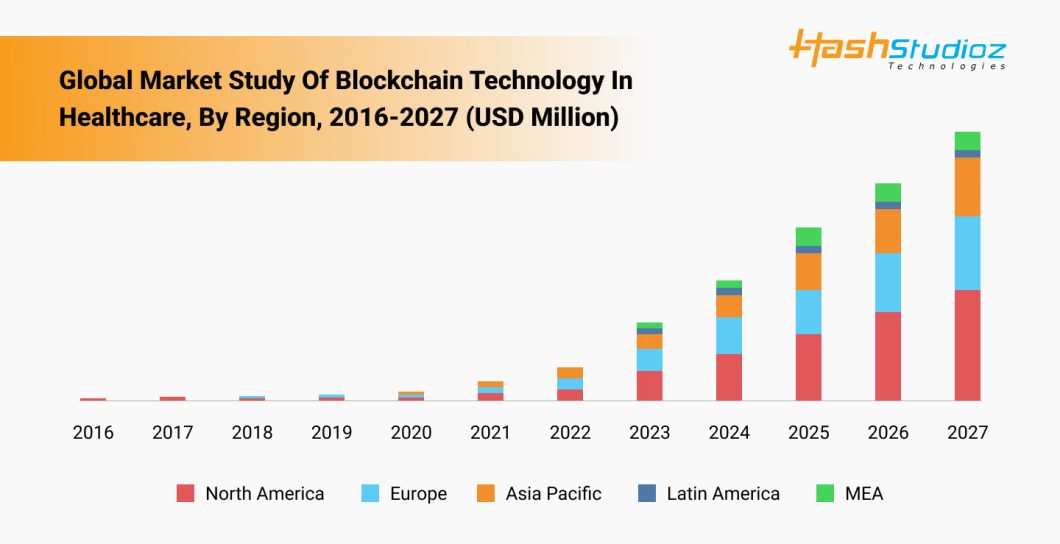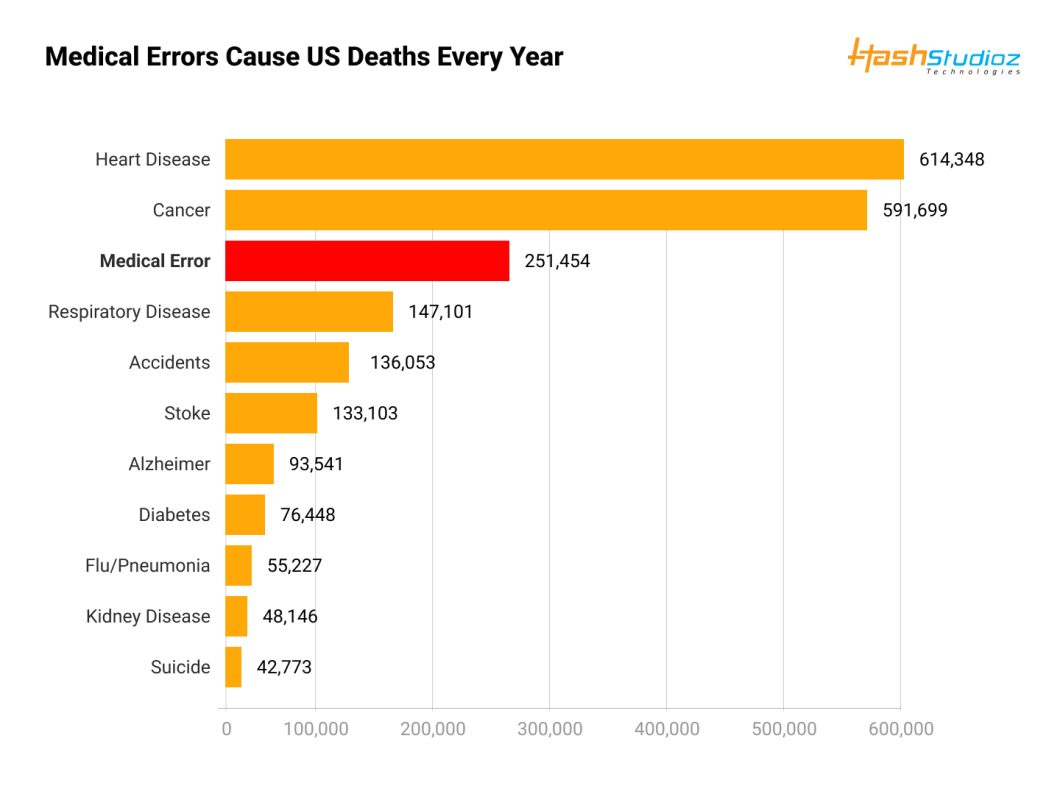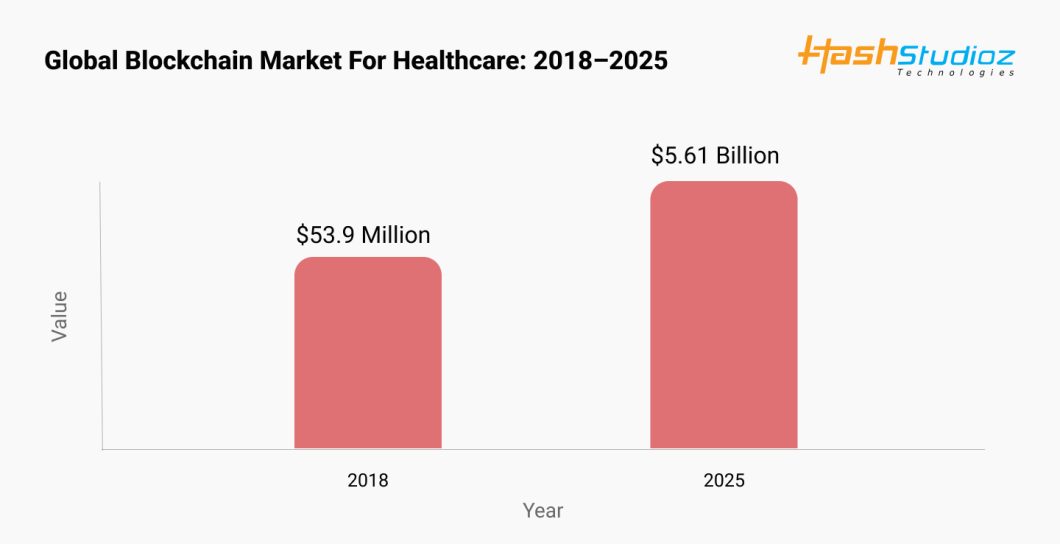Blockchain technology allows multiple parties to securely share and access data. Digital health poses a significant challenge despite the importance of privacy and security. The ability to analyze medical data at the population level and coordinate patient data across the healthcare system is essential to improving the quality of care.
Digital health systems can benefit from blockchain as it allows data to be shared securely, with patient consent, across fragmented healthcare systems. In the healthcare industry, blockchain holds incredible appeal for healthcare providers who need access to a patient’s complete medical history efficiently and securely.
Discover how blockchain technology may affect patient care and healthcare providers in the future.
Table of Contents
Why is blockchain important?
Identifying real blockchain-based applications from hype is one of the biggest challenges around blockchain. Beyond Bitcoin, there are still only a few large-scale, real-world blockchain implementations.
With its revolutionary proposition, blockchain eliminates the need for centralized authority and instead distributes power amongst everyone involved in its ecosystem through a carefully balanced combination of advanced cryptography and in-built incentives (in the form of Bitcoins or other crypto-tokens). Thus, in theory, it could eliminate the need for a third party to manage digital, secure and impartial transactions between unknowing and untrusting parties.
Although these tools work well in Bitcoin’s ecosystem, they have yet to be proven in more traditional business settings. The advantage of a decentralized system is the control end users have over their data – particularly consumers, but also enterprises.

Blockchain-enabled companies have long-term goals of decentralizing the data economy, reclaiming control from companies like Google, Facebook, Amazon, and others that monopolize large datasets, and enabling individuals and organizations to decide how their proprietary and personal data will be used.
Furthermore, blockchain’s built-in payment mechanisms enable users to sell their data for crypto-tokens and improve visibility and control. By applying AI to the blockchain tracking ledger, valuable data sets will be curated and buyers and sellers will be matched.
It may take a decade or longer for this idea to become a reality. Despite early growth pains – such as poor user interfaces, scalability problems, and privacy concerns – blockchain has proven to be a reliable and accessible solution to more specific but real data reliability and accessibility issues over the past few years.
What does blockchain excel at?
- Tracking/registry: Transparency and immutability of data, where no party has asymmetric power over it
- Data access/transfer: Creating a common source of “truth” for data transfer between multiple parties
- Authentication: The ability to verify identity attributes without disclosing sensitive information, including managing identities and permissions for authentication or verification
- Settlements: An accounting method that tracks the movement of goods/revenues or the use of assets/services in order to settle revenue
- Transactions: Facilitating (real-time) payments and transactions

What advantages do these abilities provide for businesses?
- Security: DDoS cyberattacks and tampering with records are extremely difficult due to the consensus system used in blockchain storage and verification
- Cost efficiency: Consensus mechanisms create trust through transparency, removing middlemen who take a cut of transactions
- Traceability: It is possible to reduce fraud and protect against liability if all transactions are immutable
- Business process speed: By automating smart contracts, transactions will take less time since manual oversight is no longer necessary
- Token value: Virtual tokens can be used for loyalty rewards programs, for example, to store virtual and real-world value
- Confidentiality: The sharing of sensitive information, e.g. individual medical records, between organizations is not necessary.
- Neutral & equal: Blockchain does not belong to any one company or individual. If one of the founding parties leaves, the system will continue to function without them, enhancing trustworthiness and longevity.
This Blog Outlines 7 Key Use Cases For Blockchain In Digital health:
1. Patient-centric EHRs
Sharing medical data is a highly sensitive process. Researchers found that 74% of physicians and nurses believe that sharing health information across departments poses a risk to patient safety.
Blockchains are commonly used in healthcare to offer a comprehensive view of patient records and manage consent for data sharing. Patients have full control over their records – they are notified when their data is updated, and they can share full or partial records with doctors, researchers, and others.
Moreover, patients can set a time limit on how long their records are visible to third parties. Using this system, insurers can validate confirmations directly with patients.

2. High-security standards for data encryption
The use of blockchain technology in healthcare is plentiful, but preventing data breaches is probably the most significant. Almost nothing terrifies healthcare network users more than that.
There’s more to it than just not wanting their payment methods or social security numbers disclosed. Additionally, if something private is happening to them, they might not want their medication information released.
As we explore blockchain applications in healthcare, we quickly see that robust security standards are needed to prevent sensitive data from being flung far and wide. Using blockchain technology, data can be recorded, encrypted, and anchored to the public blockchain, providing secure data transfer methods.
Blockchain data encryption is almost hacker-proof. As telemedicine applications develop dynamically, it is very advantageous to use them, but HIPAA requires the use of safe data transfer methods and communications in healthcare. This new technology is a hit with doctors and patients.
3. Smart contract creation
Smart contracts for insurance are another popular blockchain use case in healthcare. Providers of insurance services can automate insurance issuance and transfer their processes to a digital environment using this technology.
Smart contracts will be easily accessible on the blockchain, so there will be no disputes over insurance terms. You can check everything related to drug reimbursement or health insurance coverage online.
Further, smart contracts provide insurers with the opportunity to utilize advanced analytics, thus optimizing policies for their clients.
4. Credentialing on the blockchain is faster
Verifying credentials such as training, skills, licenses, and degrees is a tedious and time-consuming process that is commonly handled via phone and email and can take up to four months.
Almost $2 billion is spent annually by payers on maintaining a comprehensive database of healthcare providers, according to the Council for Affordable Quality Healthcare. It is possible to create a faster, more reliable substitute for direct human references using blockchain technology.
Healthcare organizations can log and monitor the credentials of their staff using blockchain technology. In this arrangement, subcontractors, hospitals, and patients benefit from a more streamlined hiring process and greater transparency. When professionals need to add qualifications, blockchain records allow incremental updates.

5. Sharing and managing patient data
One of the biggest challenges facing healthcare is securing patient information.When records are kept in separate silos, they may become conflicting, ambiguous, or incomplete. Furthermore, patients often have to carry their medical information with them when their doctors refer them to other doctors.
Using outdated, unsecured systems that are disconnected from other healthcare systems and applications leads to poor data handling, increased security risks, and inadvertent disclosures. There is a waste of resources, time, and potential legal liability as a result of these challenges.
With blockchain technology’s inherent privacy and security features, patient data can be protected while patients, doctors, and healthcare providers can share the same information securely and rapidly. Blockchain can be used to securely store medical records and encrypt them with private keys, for example.
Having it accessible only to certain individuals gives patients more control over their own records and ensures privacy without requiring a central gatekeeper. Also, blockchain technology can reduce errors caused by conflicting medical information and patient documentation.
The use of blockchain technology in conjunction with smart contracts can be used to set parameters that will only permit access to patient data in accordance with the consent policy of the patient.
An application of blockchain technology in the healthcare industry can result in a single system for tracking secure and continuously updated health records and allowing authorized users quick access and retrieval. It is also possible to prevent countless mistakes by avoiding miscommunication between healthcare professionals caring for the same patient. As a result, patients will receive a faster diagnosis and personalized care.
6. Remote monitoring with IoT security
The adoption of remote monitoring solutions has become one of the biggest trends in digital health, enabling healthcare professionals to access vital signs that can be measured remotely.
This will enable them to provide more proactive and preventative care to patients.
However, security remains a major concern in health IoT, both in terms of maintaining patient confidentiality and preventing false information from being generated. If a connected device is required to alert an elderly carer to a fall or heart attack, for example, the supporting systems must also be highly resilient to DDoS or other attacks that disrupt service.
7. Healthcare transactions control
Every day, hospitals and clinics process thousands of patient claims and remittances. Patients are also notified of outstanding payments. Data can be misused by fraudsters in a variety of ways. Some of these hackers cultivate a high level of skill, which makes identity theft a real concern.
Blockchain technology can minimize claim denials. Underpayments can be reported quickly, reducing human error and delay.
Blockchain Technology Improves Transparency, Accuracy, And Privacy In The Healthcare Industry

The healthcare sector could be completely changed by blockchain technology. Several stakeholders in the healthcare sector need to increase their collaborative efforts to reap the benefits of this technology.
As value-based care becomes increasingly common, blockchain remains at the forefront of technological innovation in the healthcare industry. In a data-driven future, it could result in billions of dollars in cost savings and generate innovations.
Conclusion
Due to its inherent encryption and decentralization, blockchain has many innovative applications in healthcare. This technology improves the security of electronic medical records, monetizes health information, improves interoperability among healthcare organizations, and combats counterfeit medicines.
Digital agreements, which are enabled by intelligent contracts, are one of the most critical applications of Blockchain technology in the healthcare field. Intelligent contracts reduce costs by removing intermediaries from the payment chain. The adoption of associated advanced technologies in the healthcare ecosystem is critical to blockchain potential in healthcare. Clinical trials are included, as are system tracking, healthcare insurance, and medicine tracing. By tracking devices throughout the life cycle, hospitals can use a Blockchain framework to chart their services.
A blockchain development company can be used to improve patient history management, specifically tracking and insurance mediation process, thereby speeding up clinical actions and optimizing data maintenance. Patients and physicians would significantly benefit from this technology, which will revolutionize the way clinical records are used and treated, thereby improving healthcare services.
HashStudioz Technologies Inc. offers a wide variety of blockchain development services. We specialize in decentralized applications with well-structured blockchain security.


